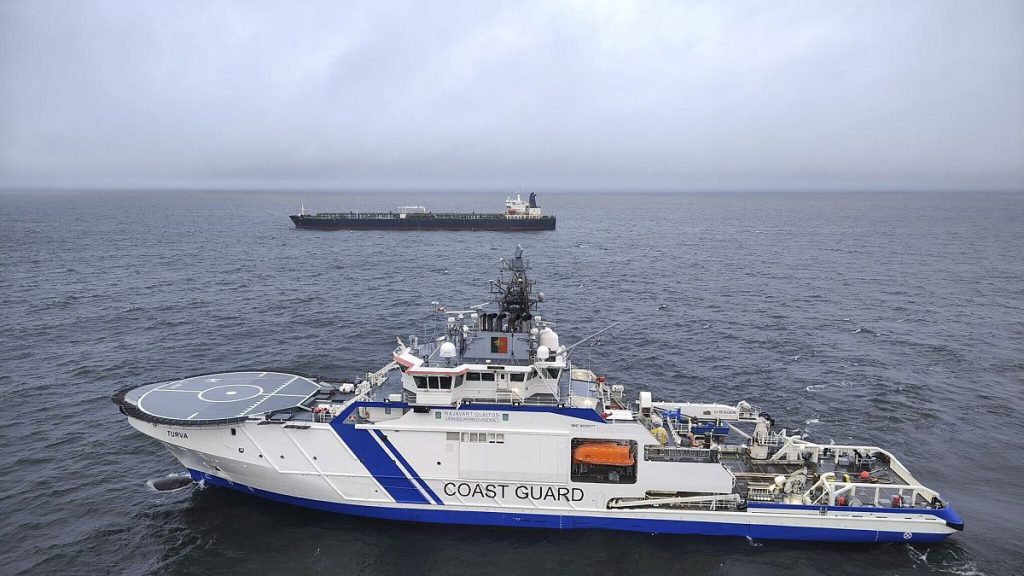Countries in the Baltic Sea region have been on high alert due to a series of incidents involving undersea cables and gas pipelines since 2022. The European Union’s Foreign Policy chief has announced that the bloc is preparing sanctions on what it refers to as Russia’s ‘shadow fleet’ following damage to an undersea power cable connecting Finland and Estonia. The vessel suspected of causing the damage is part of Russia’s shadow fleet, which is seen as a threat to security and the environment while funding Russia’s war efforts. The EU is working on enhancing efforts to safeguard undersea cables, although there is no immediate risk to regional electricity supplies.
In response to the damage to the Estlink-2 power cable, Finnish authorities detained a Russian ship and took over control of the vessel in Finnish territorial waters. The ship was identified as part of Russia’s shadow fleet of fuel tankers, which are older vessels with uncertain ownership, acquired to evade Western sanctions and operating without proper insurance coverage. This has raised concerns about potential environmental accidents. The Estonian government held an emergency meeting to address the incident, with Prime Minister Kristen Michal highlighting the role of shadow tankers in supporting Russian hybrid attacks. The repair of the damaged cable could take up to seven months, and Estonia is working with Finland and other NATO allies to address the systemic threat posed by repeated infrastructure damage in the Baltic Sea.
The incidents in the Baltic Sea, including the severing of two data cables and damage to the Nord Stream pipelines, have raised concerns about sabotage in the region. The German defence minister has stated that the incidents are likely acts of sabotage, although evidence and responsible parties have not been identified. Criminal investigations have been launched into the sabotage of the Nord Stream pipelines, which are essential for transporting natural gas from Russia to Germany. These incidents have put countries in the region on high alert and prompted calls for greater monitoring and protection of critical infrastructure both on land and at sea.
The European Union’s response to the damage to undersea cables in the Baltic Sea reflects a growing concern over Russia’s shadow fleet and its potential threats to security, the environment, and funding for Russia’s war efforts. The EU’s efforts to strengthen protection of undersea cables aim to prevent further incidents and maintain regional electricity supplies. The Finnish authorities’ detention of a Russian vessel and the subsequent investigation into the damage to the Estlink-2 power cable highlight the potential risks posed by Russia’s shadow fleet of fuel tankers, which operate without proper insurance coverage and raise environmental concerns. Collaboration among Baltic Sea countries and NATO allies is seen as essential in addressing the systemic threat posed by repeated infrastructure damage in the region.
The incidents involving undersea cables and gas pipelines in the Baltic Sea have underscored the need for enhanced monitoring and protection of critical infrastructure. Estonia’s President Alar Karis has emphasized the importance of taking action to counter the threats posed by repeated damage to Baltic Sea infrastructure, calling for a joint effort with Finland and other NATO allies. The sabotage of undersea cables and gas pipelines in the region has raised concerns about potential security risks and environmental impacts, prompting calls for greater vigilance and collaboration among countries in the Baltic Sea region. The incidents serve as a reminder of the importance of safeguarding critical infrastructure against threats posed by Russia’s shadow fleet and other potential actors seeking to disrupt regional stability and security.
In conclusion, the series of incidents involving undersea cables and gas pipelines in the Baltic Sea since 2022 have raised alarm among countries in the region. The response from the European Union, including the preparation of sanctions on Russia’s shadow fleet and efforts to strengthen protection of undersea cables, reflects a growing concern over potential security threats and environmental risks. The detention of a Russian vessel by Finnish authorities and the subsequent investigation into the damage to the Estlink-2 power cable highlight the challenges posed by Russia’s shadow fleet and the need for enhanced monitoring of critical infrastructure. Collaboration among Baltic Sea countries and NATO allies is crucial in addressing the systemic threat posed by repeated infrastructure damage and ensuring the security and stability of the region.


